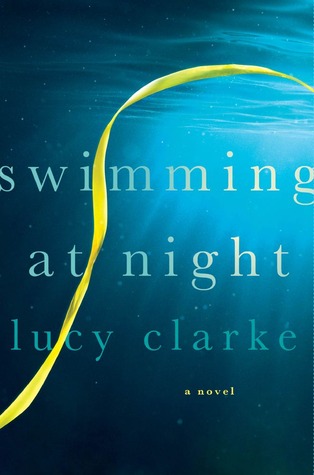 I mentioned Swimming at Night, by Lucy Clarke last week as my book-on-deck. It was passed along to me by a friend who was college housemates with the author's husband. (I guess friend of a friend would have been a bit shorter way of saying that, no?). It's the story about two sisters, about the way our relationships influence who we are, about choices and consequences.
I mentioned Swimming at Night, by Lucy Clarke last week as my book-on-deck. It was passed along to me by a friend who was college housemates with the author's husband. (I guess friend of a friend would have been a bit shorter way of saying that, no?). It's the story about two sisters, about the way our relationships influence who we are, about choices and consequences.The book opens with older sister Katie learning of her sister Mia's apparent suicide in Bali. Mia had been on a year-long traveling adventure with her best friend Finn. Katie, struggling to cope with her grief and understand why her sister would commit suicide, decides to read Mia's travel journal and follow in her footsteps to try and figure out what happned. The book is told from both viewpoints: alternating between Mia's experiences on her trip leading up to Bali and on Katie's journey to retracer her steps. As the story unfolds, we also learn more of Mia and Katie's history, more of their relationship, and some of the defining moments that have led up to where they are now.
I really enjoyed this book. Clarke did an excellent job at unfolding the story in a backwards-forwards kind of way -- the trip part of the story was the forward motion, the "what's happening now." But at the same time, Clarke begins to reveal more about the two characters as she tells us about their past as children, teenagers, and young women, even the events that led to Mia's trip to beging with. There's a lot of misplaced guilt in this book, and a lot of this-all-could-have-been-avoided-with-some-better-communication. But, that's kind of how life is, right? Hind sight is 20-20, and all you can do is move forward, hopefully learning from the past. That's another thing I liked about the book: there's a deep sadness for things lost, but at the same time, there's healing and hope for the future.
Another highlight of the book is the secondary character of the sea. You can sense the author's own connection with the water. Living in a beach town, I've met people who "like the beach" and people for whom being near the water is as essential as breathing. The people who have saltwater running through their veins and a permanent crust of sand on their feet and who feel claustrophobic if they spend too much time land-locked. Thinking about it now, I would say that the along with the well-drawn human characters, it's pervasive presence of the sea that keeps what could be an overly-dramatic plot from being overwraught.
Bottom line: lovely writing, a tightly plotted dramatic story, well-drawn characters, sisters and the smell of salt water.
No comments:
Post a Comment